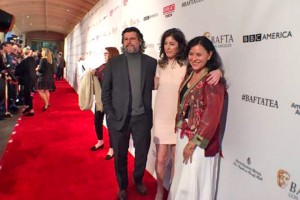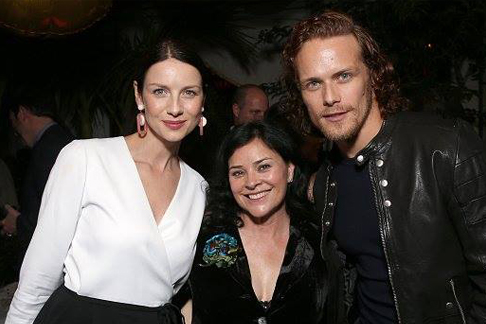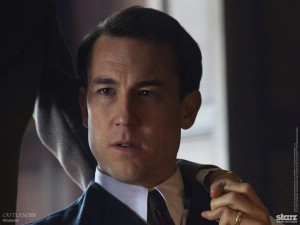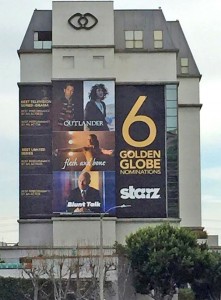March 20, 2016
Over the years, I’ve done hundreds (literally) of interviews, and frankly, most of them consist of the same six or seven questions, over and over (and over and overandoverandover)—with the excuse, "Of course, I know you’ve probably (oh, you think?) answered some (ha) of these questions before, but these are things we think our readers would like to know." (Perfectly legit assumption. That’s why all those answers are in the "FAQ" section of my website… and on my Wikipedia page (or at least I hope they’re still there)… and in THE OUTLANDISH COMPANIONS.)
"So…. how did you get the idea to write these books?"
But never mind; they have their job and I have mine. (Yes, I admit that these interviews give the books visibility, and I appreciate the attention. That’s why I go on answering those six or seven questions with a reasonably convincing appearance of gracious enthusiasm (I’ve seen myself do it several times on video, that’s how I know…). Still, once in awhile you get an interesting interviewer, who makes you think—and that’s a great thing, both for me and the people who read the interview. The NPR interviewers are absolutely wonderful; it’s great fun (both for me and—I hope—the listeners) to work with one of them. But there are quite a few good print journalists, as well, and I thought I might post a few excerpts from some of those interviews here. Feel free to ask your own questions, too <g>—I’ll answer what I can.
So—these questions are from a wattpad interview done with Molly Rogers, about five years ago. The complete interview is probably still available on wattpad, but I thought some of the later questions and answers were more interesting (and it’s a looong-ish interview; too long for a good post).
12. Your books require a large amount of research. How did you do that in the beginning when you were just starting out and how is it different now that you are a full-time writer? Do you plan out what research you will need to do for a scene you are writing or do you just write until you need to look something up and then stop and hit the books?
Since I generally have no particular idea what’s in a scene until I finish writing it… Well, let’s see. It’s not a very tidy process, let’s put it that way.
Speaking just generally, I read several "overview" books or accounts covering the general period (of years) and/or particular events (like battles) that I know will be of relevance. Doing any kind of research is like grabbing the end of a long piece of yarn and pulling— you don’t know what the other end is attached to, and you may end up in convoluted tangles—but you can be sure there’s something there. I find a lot of something. There is logic to it—and sometimes I really am looking for a specific bit of information—but for the most part, the writing and the research are done concurrently; they feed off each other.
Let’s see if I can show you a rough notion of how that works:
I may realize that I need to know quite a bit about, say, the Battle of Saratoga, because I know that takes place during the story. So I go and read Richard M. Ketchum’s excellent book, SARATOGA, and in that, learn that Brigadier General Simon Fraser was killed by a sharp-shooter during one of the battles. Plainly, General Fraser must be a relative of Jamie Fraser’s, and this death would be important to him. I learned also the circumstances of the death—that the General died slowly, over the course of a night. So there would be time for Jamie to come to bid him farewell. And I began to see Jamie at the death-bed of Simon Fraser. But I also saw William—Jamie’s illegitimate son—at the other side of the bed. All right, very dramatic. But how might he have come to be there? So I go back to other references, and trace the major events of the life of Simon Fraser—and find a place where William might have become his aide.
(In the process, I also learn that Simon Fraser was involved in the great adventure prior to the Battle of Quebec, when the Highlanders climbed the impassable cliff at night to make a way for the British army to arrive on the Plains of Abraham at dawn. Now, there’s a cool story <g>— and it (and Simon Fraser) turned up in a novella I wrote, titled "The Custom of the Army.")
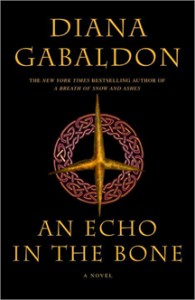 But coming back to AN ECHO IN THE BONE… I walked the battlefield at Saratoga three times over the years before I wrote the book, and during one conversation with a park ranger, learned that while General Fraser had told his men he wanted to be buried in the Great Redoubt, and many accounts that I’ve seen say that he was— when the Park Service excavated the Great Redoubt, there was no sign of a body. A couple of buttons, but no imprint or other sign that a body had lain there— and the map of the field showed Gen. Fraser’s grave as being near the river.
But coming back to AN ECHO IN THE BONE… I walked the battlefield at Saratoga three times over the years before I wrote the book, and during one conversation with a park ranger, learned that while General Fraser had told his men he wanted to be buried in the Great Redoubt, and many accounts that I’ve seen say that he was— when the Park Service excavated the Great Redoubt, there was no sign of a body. A couple of buttons, but no imprint or other sign that a body had lain there— and the map of the field showed Gen. Fraser’s grave as being near the river.
I asked where it was, as I’d like to see it, and the ranger said that in fact, they didn’t know. It wasn’t marked; they just had an account saying that the body had been moved near the river—probably as a temporary measure—but nobody knew exactly what had become of it. "Really?" said I to myself. "Well…. what if….?"
Because I knew I needed a way for Jamie to go back to Scotland. He couldn’t just leave the army and go, for no apparent reason. But what if his cousin Simon had asked him to take his body back to Scotland? I knew further from SARATOGA that the negotiations between General Burgoyne and General Gates after the final battle were prolonged and complicated. I also knew that Burgoyne was close to Simon Fraser and saddened by his death. So… what is more reasonable than that General Burgoyne would ask, during these negotiations, that General Gates send Jamie (and his wife, of course) to return Simon Fraser’s body to Scotland? Or that General Gates, tired of the hassle, would want to do this small courtesy for Burgoyne in hopes of easing the negotiations?
So there it was; I knew how and why William came to be at the death-bed (and thus to meet Jamie—briefly—face-to-face, but in traumatic circumstances that would prevent his realizing who he was), and how Jamie got to Scotland.
Later, I was in Scotland, and decided to see if I could find a suitable spot where Simon Fraser might have been buried. So I went back to the research material and found the general area—Balnain—where his family home had been, and my husband and I went driving, poking around there, just to get an idea of the countryside, so I could describe his funeral. But while doing this, I realized that we were near an ancient tomb called Corriemony, and told my husband I wanted to see it.
I was thinking vaguely that Simon might have been buried close enough that Claire could come across the tomb, and I could use it for something atmospheric or poetic— but in reading the explanatory material posted at the site, I learned that:
- The original burial (of which there were still traces) had vanished—perhaps stolen—and
- When the tomb was opened in modern times, there was a body in it—but it wasn’t an ancient body; it had been placed there sometime in the previous 200 years. "Oh, HO," I said. "So now I know where Simon Fraser was really buried!" <g>
Anyway—this all started because I could see William and Jamie kneeling on opposite sides of Simon Fraser’s deathbed, Jamie knowing, and William not knowing.
This is how books evolve for me; I "see" things, here and there, and I write them, and then many other things gradually come about because of those…. anchors, I suppose you could call them. I do what research I seem to need in the writing of these bits, and then—invariably—find things in the research that stimulate other scenes, either directly or indirectly connected.
13. You’ve said before that your writing style is to write all the scenes and then piece them together in order when you’ve gotten them all done. Do you only do this for novels or does it apply to your short stories and novellas as well? Why is this method so effective for you and do you ever try writing in a straight line just for the fun of it?
What fun would that be? <puzzled look> It would take forever to do it that way, since I couldn’t start writing until I’d figured out the entire story, and if I’d done that, it wouldn’t be fun at all to write it.
Anyway, yes; I write just about everything piecemeal, including nonfiction articles, book reviews and essays. It’s effective because it works; I’m never held up stewing about What Comes Next— I don’t care what comes next, I just care about something I can see happening. The order of the happening has a logic to it (often, more than one), and that will become clear to me as I work.
14. How do you approach the crafting of your characters and manage to get them to a point where they seem like real people? Is there one of your characters that you consider your favorite and why?
What a very peculiar notion of writing—though I do realize it’s a common one. Possibly some people really do that, but I can’t imagine how.
Look. It’s not like Legos. You (well, I) don’t start with a crude outline of a character and then start putting little blocks—alcoholic mother, abused as child, has sister he doesn’t get along with, INTJ personality type (whatever that may mean; I do know writers who use psychological personality tests on their characters, which seems truly bizarre—but probably no stranger than the way anybody else does it; whatever works, I mean…)— together according to this plan, to make a three-dimensional golem which you then zap with electricity.
For me, characters are onions, mushrooms, or Hard Nuts:
- An onion is a person whose essence I apprehend immediately, but the more I work with him or her (by "work with," I mean, "write stuff involving them"), the more layers they develop, and the more rounded and pungent they become.
- Mushrooms are the characters who simply pop up out of nowhere and walk off with any scene they’re in.
- And Hard Nuts tend to be the people I’m stuck with—rather than the ones who just show up in my head—either for plot reasons (I had a woman pregnant at the end of one book, so when I rejoined her twenty years later, obviously I had a young adult in addition to deal with), or because they were real historical people who were present during an event or period. Them I just hammer on until they break open and reveal something of their inner selves to me.
15. What do you feel are your strengths and weaknesses as a writer?
I like complexity. <g>
16. What is the underlying geometric principle that you use when you are writing your books and how do you apply that to your writing? (Interviewer’s note: I’m really curious about this! It sounds so fascinating but I can’t quite figure out how you apply geometry to writing in practice.)
Well, it’s not a geometric principle— it’s just that I think in geometric shapes. Let’s see <groping for a decent metaphor>…
You know how a kaleidoscope works, right? (To save any of your readers having to Google it— essentially, you have a tube with two or three rectangular mirrors in it, oriented at angles, which make multiple symmetric reflections of whatever colored objects you put at the front end of the tube.) Well, imagine that I have a three-mirrored kaleidoscope: one mirror is the historical plane of reflection—the events, the timeline, the cultural/intellectual milieu, the physical settings and constraints. The second is the plane of reflection that concerns the characters—who they are, their motivations, their personal histories. And the third is my own plane of reflection—the background, experiences, perceptions, and personality that make me unique.
OK. So say I have a handful of these disparate scenes. Placed in the space formed by my three mirrors, they form patterns. And if I rotate the tube (so to speak), this causes the pieces inside to fall into a different relationship to each other, and I see different patterns. Some patterns are naturally more pleasing than others, and I use the ones that seem most aesthetically logical. (Occasionally I do have a piece that just isn’t necessary in the overall pattern, in which case I take it out and hang onto it—it generally "goes" somewhere in the next book.)
Hearing about this process does, btw, infuriate people who write linearly. I once had a woman sitting on a panel on writing processes with me inform me that I couldn’t possibly do this, because "you have to have a logical foundation! You can’t put the roof on your building unless you’ve built solid walls to hold it up, can you?"
"Of course I can," I replied. "There’s no gravity in the mind, after all. I can make the roof and just leave it hanging there until I have time to build walls under it. You don’t have to write a book from beginning to end, just because that’s how people will read it." She Wasn’t Pleased, but the point here is that people’s minds are wired up differently, and a good deal of writing successfully lies in figuring out how your own mind works best, and using it that way. There is no "right" way to write a book. Anything that lets you get words on the page is the right thing to do.
[There is, btw, a longish essay, titled "The Shape of Things," in the extra goodies at the back of the OUTLANDER 20th Anniversary Edition, that goes into the question of shapes— and analyzes the shapes underlying all the main books in the series. I think I put this in one of the OUTLANDISH COMPANION volumes, too…]
Your comments to my blog posts are welcomed! Click on the "Comments" link. Note that your comment will not appear automatically and immediately, and you may receive a message saying it is “awaiting moderation.” This means that your comment is waiting for me to read and approve it. Depending on my schedule, that may take a few days (or longer). No comments will appear until I have read them.
This blog was originally posted on my official Facebook page on March 20, 2016.

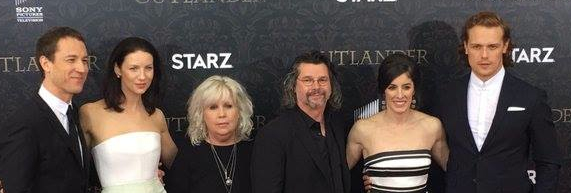
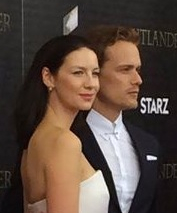


 I won’t, alas,
I won’t, alas, 
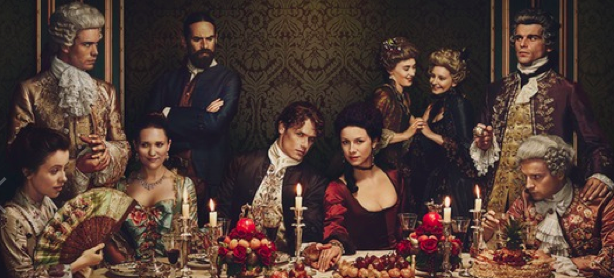
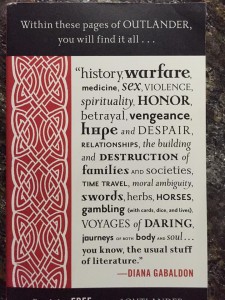
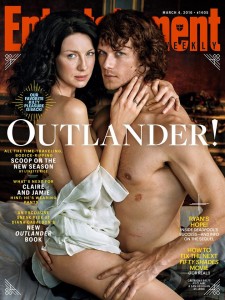


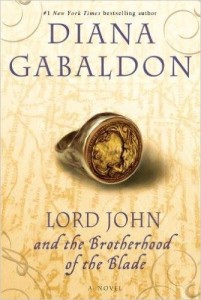
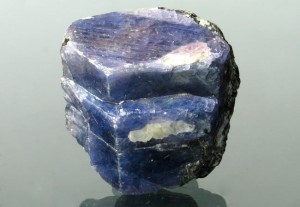
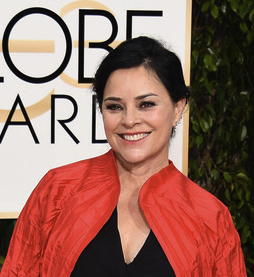
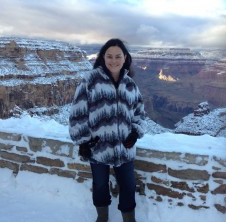 When I was finally born, just at dark, my father was so unnerved by the entire experience that he went out to a nearby restaurant and ordered ham and eggs for dinner—forgetting that it was Friday. (Way back when, Catholics didn’t eat meat on Fridays.) Driving the thirty miles home through snow and black ice, he ran off the road twice, got stuck in the drifts, and—as he later recounted—managed to free himself only because he couldn’t stand the thought of freezing to death and leaving my mother with a one-day-old child.
When I was finally born, just at dark, my father was so unnerved by the entire experience that he went out to a nearby restaurant and ordered ham and eggs for dinner—forgetting that it was Friday. (Way back when, Catholics didn’t eat meat on Fridays.) Driving the thirty miles home through snow and black ice, he ran off the road twice, got stuck in the drifts, and—as he later recounted—managed to free himself only because he couldn’t stand the thought of freezing to death and leaving my mother with a one-day-old child.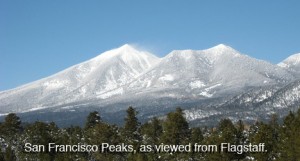
 We (and the fourth generation) live in Scottsdale, but I still keep the family house in Flagstaff, and escape there regularly to write; to me, the ideal weather for writing involves a gleaming portcullis of icicles to keep out all intruders, soft white drifts on the pines and the sidewalks, and the muffled grind of cars in the distance, crushing cinders into the slippery packed snow as they labor uphill. No salt on these roads; the San Francisco peaks are in fact one mountain, the remains of an extinct volcano—or least we hope it is extinct;
We (and the fourth generation) live in Scottsdale, but I still keep the family house in Flagstaff, and escape there regularly to write; to me, the ideal weather for writing involves a gleaming portcullis of icicles to keep out all intruders, soft white drifts on the pines and the sidewalks, and the muffled grind of cars in the distance, crushing cinders into the slippery packed snow as they labor uphill. No salt on these roads; the San Francisco peaks are in fact one mountain, the remains of an extinct volcano—or least we hope it is extinct; 